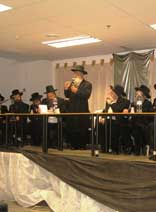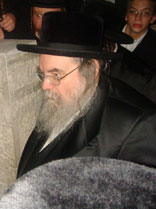In News
Pulling the Plug on Open Internet
Facing a global issue, rabbis gathered in Beitar Illit for a conference, the first of its kind in the city, and placed a prohibition on using open internet
The gathering was arranged by the secretaries of the city’s rabbinical court and the directors of educational institutions and was held in the municipality’s local youth cultural center on Rechov Breslov. It was attended by all the city’s rabbis.
The mara d’asra, local rabbinic authority, HaGaon Rabbi David Tzvi Ordentlich shlit’a, emphasized in his emotional address the enormous danger inherent in open internet, which has caused many Jews in our generation to fall by the wayside. “This is a danger a thousand times more than all the dangers that lay in ambush to the Jewish people, both externally and from within. The internet is like a tsunami that threatens to engulf and endanger the entire building of chareidi Judaism, which has been built with such great toil and enormous effort in this generation. This is a topic that must not pass from the public agenda. We must warn about it, at every time, in every place,” he said.
HaGaon Rabbi Tzvi Braverman shlit’a, a member of the rabbinic court, who stands behind the initiative of increasing awareness of disconnecting from open internet, spoke with feeling and cried out from the depths of his heart about the fact that the public and the rabbis hide their eyes from those who connect to the internet. As is well known, tens of thousands of chareidim connect to open internet providers, Heaven help us.
He stressed in his address: “It’s not for nothing that all the rabbis of Beitar have gathered here. Fifty percent of the city’s problems, whether in harmony of the home or in children’s education, stem from the internet. There is a hidden conflagration in the city. An atom bomb sits under the city. Some people keep an explosive powder keg in their home. Who can accept responsibility for this? Therefore, all the rabbis have gathered here to look for advice. It’s not enough to ask, ‘What do they do in other cities?’ We have to confront the challenges of this city. It cannot be that a G-d fearing Jew in Beitar will send his child to a Torah school and that he will have in his home – not a single television – but something much worse. This is the battle of the generation.”
Other speakers included the mara d’asra, HaGaon Rabbi Yaakov Tupik shlit’a, HaGaon Rabbi Asher Lemil shlit’a, the rabbi of the Chabad community, Rabbi Yudelevitz, shlit’a, and more.
 |
Other rabbis that participated in the meeting included: HaGaon Rabbi Barzovsky shlit’a, rabbi of the Gefen neighborhood, HaGaon Rabbi Meir Simcha Auerbach shlit’a, rabbi of Kehillos HaRan, HaGaon Rabbi Chaim Ackerman shlit’a, HaGaon Rabbi Ami Mizrachi shlit’a, a rabbinic judge of the Sephardic Rabbinical Court in Beitar, HaGaon Rabbi Avraham Stigleitz shlit’a, the rabbi of the Sanzer community in Beitar, HaGaon Rabbi Yaakov Sofer, rabbi of the Erloi community in Beitar, HaGaon Rabbi Yehudah Leib Halshtok, and other rabbinic figures of note.
In their determination to remove the stumbling block of the internet, and especially during the Ten Days of Teshuvah, the rabbis of Beitar accepted a number of decisions that were announced at the end of the meeting by Rabbi Pesach Bornstein shlit’a, the secretary of the Rabbinic Court, as follows:
“Everyone should try not to be connected to the internet at all. Every resident of Beitar should sign a form that they accept upon themselves from now and in the future not to be connected to open internet. Someone who has compelling reason to be connected for the sake of his livelihood, and the like, is obligated to connect to an internet provider with a filtered and inspected service. All Torah educational institutions and businesses are obligated to connect only to the tracks mentioned previously. The school principals must be sure that no student that studies in their institution has open internet in their home. It has been decided that on Shabbos Shuvah the rabbi of every synagogue will speak about these decrees.”
The city’s rabbinic authority, HaGaon Rabbi David Tzvi Ordentlich shlit’a, when he left the dais towards the exit, turned around and asked for a form in order to sign on his agreement to the decree. With great excitement, he was the first to sign on the form, and he was followed by all the rabbis and everyone who was present in the hall. The mayor, Rabbi Meir Rubenstein, who was on his way back from Uman at the time of the conference, sent a message by way of HaGaon Rabbi Tzvi Braverman shlit’a that he joins in this undertaking, and promised that all the municipality’s computers will be disconnected from open internet.
The campaign initiated at this meeting was met with strong repercussions in the city, and many asked to join this blessed undertaking by disconnecting and urging others not to be connected to open internet in any fashion. In a play on words, the campaign is entitled “Chasimah Tovah L’Chatimah Tovah” – “a good blockade for a good sealing [in the Book of Life].”
The activists and the rabbis emphasize that other cities will undoubtedly join this initiative, the first campaign of its kind to disconnect an entire city and in coming days the rabbis will turn to rabbinic courts in other Israeli cities to also fulfill the precept of “and you shall clear away the evil from your midst.”







